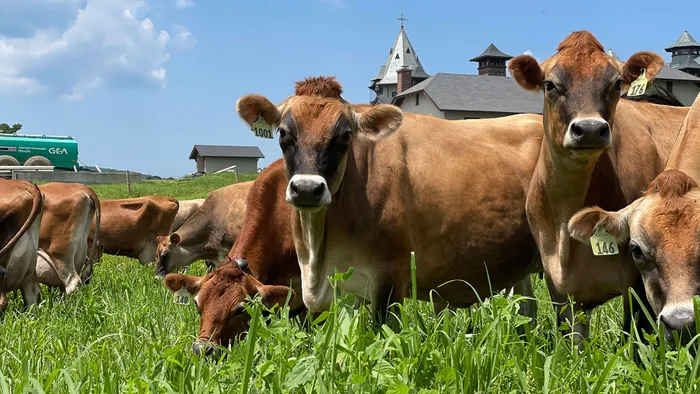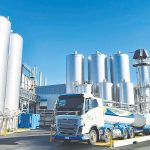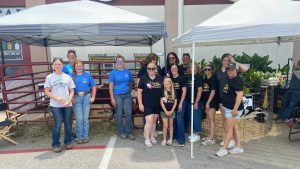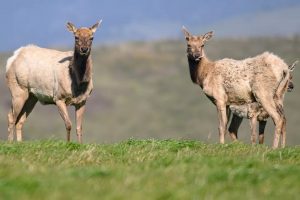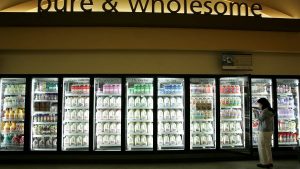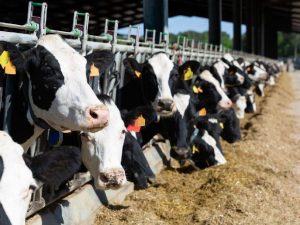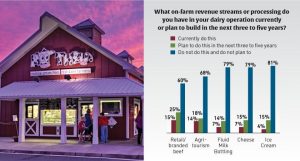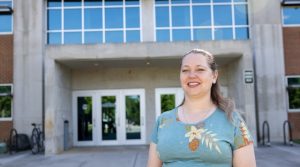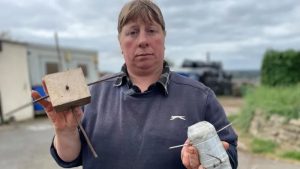
The Green Pastures Award winners were recently honored at the Big E.
New England Green Pastures winners for 2023 were honored at an awards banquet held in conjunction with the Eastern States Exposition, also known as the Big E.
Each New England state selects a winner to be honored as dairy farm of the year, and winners made presentations on their farm operations at the event.
The program has been running continuously since 1948 when the New Hampshire governor bet the other New England governors that New Hampshire had the greenest pastures. Nominated farms are judged on a variety of production criteria, and a state winner is selected.
Here are this year’s winners, by state:
Connecticut
Kellogg Dairy Center, Storrs. This facility sits atop Horsebarn Hill in Storrs, looking out over rolling fields.
The center was built in 1991 and is a freestall facility for 100 milking cows with an attached classroom, office, viewing rooms, surgical unit and two student dorm rooms. UConn added a robotic milking system in 2018 and was the first university in the country to install the technology.
Robotic feeders were added at the same time, and each cow wears a transponder that collects data. This data is shared with DeLaval to help other dairy farms worldwide manage their data and economic viability.
The herds have a rolling herd average of 29,300 pounds for the Holsteins and 21,200 pounds for the Jerseys, making them a top-10 production herd in the U.S. for herd size.
Mary-Margaret Smith is the executive director for all the UConn Livestock Units, including the Kellogg Dairy Center, and leads a team of 11 professional staff as well as student workers.
“Cow comfort is the No. 1 priority,” Smith says. “It has to be. And for them to make as much milk as possible but be healthy while doing so. The cleanliness of the milking system is also paramount.”
Maine
Green Valle Farm, Newburg. The farm began when Linwood and Myron Miller — Heath Miller’s grandfather and great-uncle — settled in Newburg in the mid-1850s and started milking cows and sold milk commercially in the 1930s.
They decided to separate after a fire in the late 1950s, but both remained in the dairy industry. The baton was passed to Keith Miller, Linwood’s son, and later to Heath, who is the fifth generation of Millers to dairy farm.
This fall, the sixth generation — Ethan and Makayla — will be attending the State University of New York and the University of New Hampshire to earn degrees in dairy herd management and production, and animal sciences focusing on pre-vet for large animals.
Currently, Green Valle Farm includes 275 Holstein cows where 82% of the animals are on milk. The herd produces more than 26,000 pounds of milk per cow, with averages of 3.9% fat, 3% protein and a 94,000 somatic cell count. The farm has two freestall barns, a dry cow-calving-fresh cow barn, a manure pit, a silage store pad and a double 10-milking parlor where the cows are milked three times a day.
The farm has an active crop program with 260 acres of brown midrib corn and 400 acres of mixed grass for silage production. The Millers also grow 50 acres of winter rye in the same area as their corn. In this way, they take advantage of the rye as a cover crop in winter and harvest it for silage before planting corn the following year.
Massachusetts
High Lawn Farm, Lee. This is a third-generation family-owned dairy in Lee with 120 registered Jersey cows on about 1,600 acres of land.
High Lawn Farm has been referred to as “the cradle of the Jersey breed.” The farm’s founders, Margorie and Colonel Wilde, have been recognized for their work in reproduction and genetics with numerous Master Breeder awards and a Distinguished Dairy Breeder Award at the National Dairy Shrine.
The farm transitioned to robotic milking equipment in 2013. This step allowed the farm to become more efficient and focus on labor in other parts of the business, such as dairy processing and production of value-added dairy products.
The farm produces all its dairy products on-site and has a small fleet of trucks that deliver products from the Berkshires to Boston, in addition to working with locally based distributors to bring its products throughout New England.
In 2020, the farm opened a year-round farm store that has artisanal dairy products, pasture-raised Angus cross beef and a variety of other locally produced goods. The store has become a staple in the community, and they maintain an online store that allows customers to send their favorite products and gift boxes throughout the U.S.
New Hampshire
Huckins Farm, New Hampton. This farm has been in business since 1906. Matty Huckins runs the small, pasture-based dairy and sells dairy products at her farm store, online and across many New Hampshire stores and food cooperatives.
The farm includes 18 Guernsey and Jersey cows and 13 replacement heifers. The cows are rotationally grazed on 42 acres of grass and alfalfa mixed pasture.
Matty’s late husband, Gordon, milked cows from the age of 5 and passed this on to his daughter, Catherine, who has milked cows her entire life.
Gordon Huckins was recognized as an outstanding Guernsey breeder and was active in the New Hampshire dairy community, participating in 4-H as a youth, and volunteering as a dairy judge and chaperone.
Matty Huckins has been an advocate for New Hampshire agriculture and dairy throughout her life. She has participated in the Belknap County Farm Bureau, serving as secretary for 10 years. She also served on the board for New Hampshire Ag in the Classroom, leading that organization as its president from 2004-10. She also worked for and led Granite State Dairy Promotion from 1994-99.
Catherine has served as 4-H leader, as a chaperone to shows across the country as a quiz bowl coach, and she is widely recognized as one of the top Guernsey breeders in the country.
The farm is a licensed raw milk dealer and works closely with the New Hampshire Dairy Sanitation Department to ensure the quality of the milk. The farm sells raw milk and maple milk and cream. It also produces kefir, raw yogurt, feta, ricotta, cheddar cheese curds and probiotic yogurt cheese spreads in small batches in the farm kitchen attached to the milkhouse.
Vermont
Hardwick-Ackermann Dairy, Hardwick. This is a 120-head organic dairy farm in Hardwick. Jimmy and Sara Ackermann have been farming for 16 years, including nine years at their current location. They milk 60 to 65 Holsteins twice daily in a tiestall barn with four units.
Their rolling herd average is 22,600 pounds with 4.1% butterfat and 3.2% protein. The Ackermanns plan to switch to robotic milkers in the next two years, a move that will allow them to grow their herd to 80 head, a size that falls within their goals to stay sustainable and on budget.
They raise all their own replacement heifers, breeding them to calve at 24 months with cows bred back at 60 days fresh. Calves are fed colostrum within a few hours of birth, then watered at three days.
The Ackermanns grow enough grass to supply all their own forage needs with surplus to sell. Most years they get four cuts of hay from their 300 acres of owned and leased land.
Cows are fed a total mixed ration of silage and dry hay. They pasture animals at night in warmer weather, bringing them in during the day. They feel it is more comfortable for the cows at night as it is cooler with fewer flies.
Future plans include building a new freestall barn with separate areas for calves, cows and heifers to house them all under one roof.
Source: Gary Anderson, University of Maine
